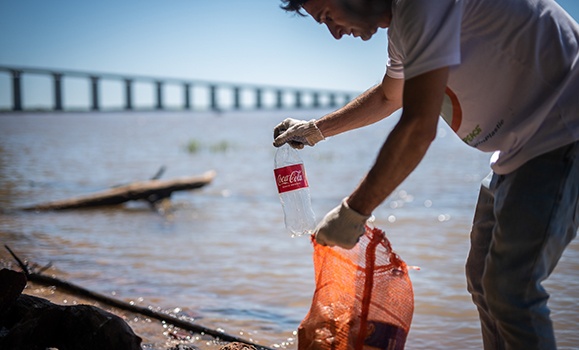
Coca-Cola, PepsiCo, Nestle, Danone are top producers of plastic waste: Study
By Food in Canada Staff
Packaging Sustainability Coca-Cola Dalhousie University Danone Editor pick Nestle PepsiCo Plastic A volunteer with the Más Río Menos Basura collective finds a Coca-Cola bottle during a brand audit in Argentina in November 2023. (Eduardo Bodiño photo)
A volunteer with the Más Río Menos Basura collective finds a Coca-Cola bottle during a brand audit in Argentina in November 2023. (Eduardo Bodiño photo) A global research study, led by scientists at Dalhousie and a dozen different universities in the United States, Australia, the Philippines, New Zealand, Estonia, Chile, Sweden and the U.K., found that 56 global companies are responsible for more than half of all branded plastic pollution. A paper in Science Advances states that the top five producers of branded plastic pollution were Coca-Cola Company, which was responsible for 11 per cent of roughly 910,000 branded items, followed by PepsiCo (five per cent), Nestle (three per cent), Danone (three per cent), and Altria/Philip Morris International (two per cent).
“This global branded plastic pollution data speaks for itself and demonstrates unequivocally that the world’s top global producers are the biggest plastics polluters,” said the study’s co-author Dr. Tony Walker of Dal’s School for Resource and Environmental Studies.
For more than five years, citizen scientists in dozens of countries combed beaches, waterways, parks, busy city streets and other public areas to quantify the amount of plastic waste in the environment and track its source.
They recorded the brand or trademark on each plastic item and the number of items with those brands wherever possible, also noting the location, date, type of plastic, type of item, number of plastic layers and time of each audit event, which ran from 2018 to 2022.
Researchers synthesized those results and found a clear link between plastic production and plastic pollution, such that a one-per-cent increase in plastic production was associated with a one-per-cent increase in plastic pollution in the environment.
The team also determined that companies producing single-use consumer goods disproportionately contributed to the problem more than household and retail companies, and that most collected items had no discernible brand.
“We were surprised to find that the direct relationship between plastic production and plastic pollution was consistent around the world, irrespective of whether the litter audits were conducted in the global north or global south,” added Dr. Walker, noting that plastic production doubled to about 400 metric tons from 2000 to 2019. “This confirms that companies responsible for omnipresent plastic pollution is consistent no matter where you live.”
The study also discovered that about 52 per cent of the more than two million inventoried plastic items had no identifiable brand, highlighting the need for better transparency about production and labeling of plastic products to enhance traceability and accountability. The researchers suggest creating an international, open-access database into which companies are obliged to quantitatively track and report their products, packaging and brands.
“When I first saw the relationship between production and pollution, I was shocked,” said co-author Win Cowger of the Moore Institute for Plastic Pollution Research. “Despite all the things big brands say they are doing, we see no positive impact from their efforts. But on the other hand, it gives me hope that reducing plastic production by fast-moving consumer goods companies will have a strong positive impact on the environment.”
The five-year analysis used data from 1,576 audit events in 84 countries. More than 100,000 volunteers submitted data through Break Free from Plastic or the 5 Gyres’ TrashBlitz app.
“Findings from this study suggest we need a paradigm shift in how we regulate plastic producers, especially the top branded producers that are responsible for half of branded plastic pollution,” said Dr. Walker.
Print this page